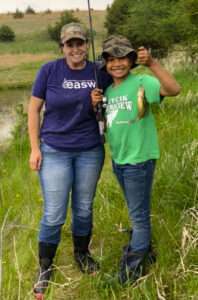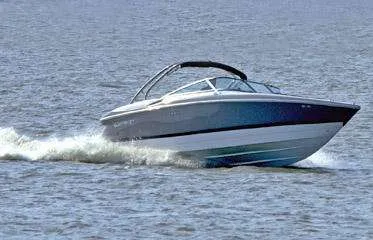By Larry Pape
Nebraska Game and Parks Commission
LINCOLN, Neb. – Consider your motivations on why you enjoy fishing. Is it to catch a meal, compete for the largest fish, get away from life’s stresses or to be with friends?
To faithfully mentor a new angler, whether they be young or old, one probably should start by asking why the angler wants to fish. The angler might have some experience but still be seeking to learn. From there, add the time, place and equipment necessary to have enjoyable fishing trips together.

Mentoring a new angler is rewarded with a smile any time a fish is caught. (Courtesy to Nebraska Game and Parks Commission)
Keep it simple. The first dabblings into any new hobby should be about discovering the basics. With fishing, this means to keep the equipment simple and effective. Fancy gear and tackle tend to need an experienced touch and can be intimidating to learn. First experiences should be comfortable and successful. Your friend’s memory of a beautiful sunset and any fish caught will hook them on angling for life.
Plan the fishing trip location for comfort and success. If the person is new to fishing, a short fishing trip to a park-like setting is perfect. City park ponds can be found across Nebraska that include groomed shorelines, restrooms and nearby services, with most of these containing plentiful bluegill, bass and catfish. The Nebraska Fishing Guide’s Public Fishing Areas section lists these special locations as Family Friendly Lakes. If your mentee is a little more experienced and wanting to learn fly-fishing, for instance, the groomed shorelines of park ponds are ideal casting practice locations, and bluegill are very susceptible to many types of artificial flies.
It is important the fishing equipment you introduce your friend to is good quality and complements the fishing experience. If a beginning angler is having trouble with a bad fishing rod and reel, he or she will be frustrated. The friend will not know if it’s equipment failure or the technique. The same is true if the equipment is complicated to use. Start a beginning angler with a push-button spin-casting reel and move more experienced anglers into spinning reels when it is appropriate. Bait-casting reels are too complicated and frustrating, unless you are mentoring an experienced bass angler.
Hope for beginner’s luck in catching a trophy fish but strive to catch any fish so the new angler is encouraged to continue. Panfish, such as bluegill, green sunfish and crappie, are plentiful statewide, easy to catch, and can be turned into a wonderful meal to give a second reward from a fishing trip.
Channel catfish offer the opportunity to catch a bigger fish with slightly more advanced techniques. Catfish are found statewide, but you can teach your mentee about finding great location by showing them the annual Fishing Forecast, which is published by the Nebraska Game and Parks Commission. Bass and walleye usually require a little more experience and are a great fish for teaching new equipment such as lures and spin casting rods and reels.
Experienced anglers know observing the success of others often is a key to our own success. Encourage beginning anglers to observe and ask questions. Information is widely available. Online resources include blogs, forums, videos and printed media. Game and Parks’ website (outdoornebraska.org) includes all of these with links on where and how to fish. The book Going Fishing (outdoornebraska.gov/howtofish) is available free to help you and your mentee with suggestions and details you may have overlooked.
And don’t forget their fishing permit, which can be purchased online and displayed on a mobile device.




